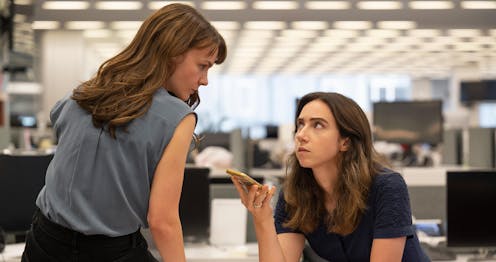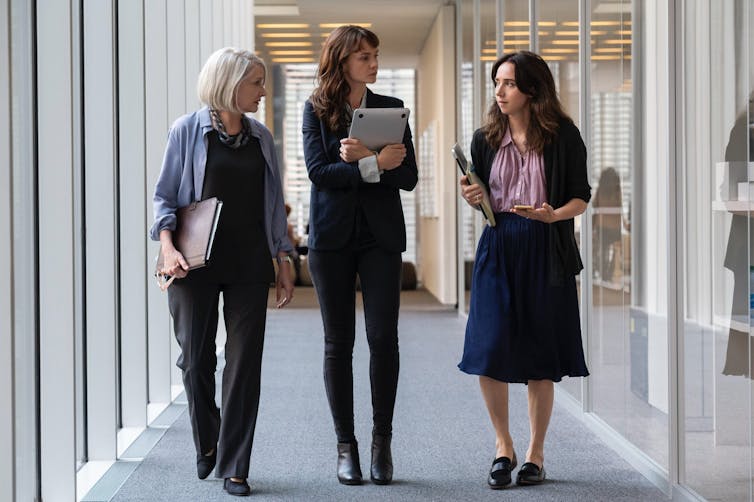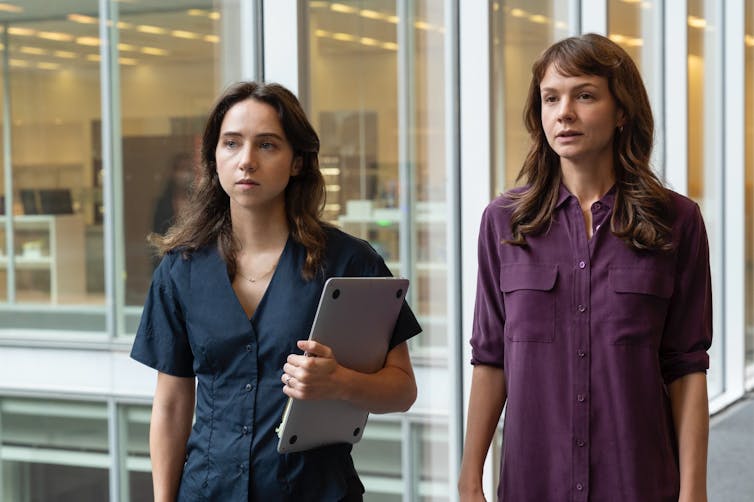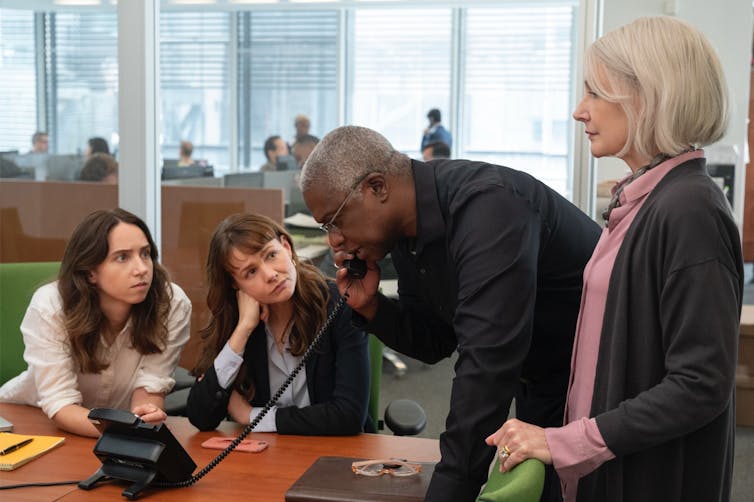
There is no spoiler alert in the Hollywood adaptation of the award-winning book She Said.
We know the story and the perpetrator, which is unusual. 80% of sexual violence cases go unreported. Perpetrators are rarely charged and continue to participate in society.
The perpetrator in She Said is the Hollywood producer Harvey Weinstein. In 2020, Weinstein was found guilty of sexually assaulting two women in New York, and was sentenced to 23 years in prison.
She Said is based on the 2019 book of the same name by New York Times journalists Jodi Kantor and Megan Twohey.
Their Pulitzer prize winning investigative reporting in 2017, along with Ronan Farrow’s reporting for The New Yorker, uncovered Weinstein’s predatory behaviour and helped to ignite the #MeToo movement.
She Said follows in the footsteps of Spotlight (2015) and The Post (2017), films reflecting rigorous journalism: months of research, fact checking and persuading people to go on the record.
But newsrooms are overwhelmingly headed up by male senior staff. This impacts on whether stories about sexual abuse are covered and how they are covered.
She Said shines an important light on the need for rigorous journalism in holding the powerful to account.
Read more: Weinstein conviction a partial victory for #MeToo, but must not overshadow work still to be done
A formidable cast and crew
She Said was created by a formidable female cast and crew. Director Maria Schrader, cinematographer Natasha Braier and writer Rebecca Lenkiewicz adapt the journalists’ fourth estate ethos with emotional intelligence.
Patricia Clarkson is savvy as the paper’s editor, Rebecca Corbett, who guides Kantor (Zoe Kazan) and Twohey (Carey Mulligan) through gruelling months of rejections, trying to bypass the nondisclosure agreements (NDAs) signed by Weinstein’s survivors.

Mulligan is cool and sophisticated as Twohey forensically grills Weinstein’s lawyer about the NDAs, while suffering from post natal depression after having her first baby.
Kazan is diligently feisty as Kantor, a mother of two young girls who is shocked when she finds out her eldest discusses what rape is at school.
Disheartened by the manipulative misogyny in the Weinstein saga, Kantor is frustrated by the women who are reluctant to go on the record. One of these women, the actor Ashley Judd, eventually shared her story about Weinstein’s sexual misconduct and plays herself in the film.
Throughout the film, we watch as the code of silence continues: victim-survivors are reluctant to come forward about accusations for fear of the ramifications they will face.
In a 2019 documentary about Weinstein, Untouchable, he is reported saying to journalists who have been chasing the allegations for 15 years: “Don’t you know who I am!?”.
Despite the US legal system giving journalists broad leeway when publishing allegations that may be construed as defamatory, Weinstein’s behaviour went unchecked for decades.
#MeToo
She Said ends when the story about Weinstein by Kantor and Twohey is published in the New York Times in October 2017.
African American activist Tarana Burke began the MeToo movement in 2006 to address the sexual violence against Black women and girls. In 2017, in response to the Weinstein reporting, Alyssa Milano used this phrase to tweet about predatory sexual behaviour by men in Hollywood.
There would go on to be 85 million tweets about #MeToo.
This hashtag became a prominent example of digital feminism activism, where citizen activists created hashtags to highlight social issues the media was failing to report on. With “hashtag journalism”, reporters followed Twitter-led hashtag trends to assess what issues to cover in the news cycle.

Despite the diversity of stories which came out of the #MeToo hashtag, initial reportage was primarily focused on white, middle-class women.
As Burke said:
I have no expectation of mainstream media to tell the stories of marginalised people unless it serves them.
The ‘Weinstein effect’
She Said vaguely reflects on the need for diversity in this reporting, but focuses on other difficulties of working in this space.
Kantor and Twohey come up against defamation issues, as well as the NDAs signed by the women. The film suggests certain laws need to be revised so journalists can continue to shine a light on injustices.
The “Weinstein effect” is the name which has been given to the increased reporting on systemic abuse following the journalism of Kantor, Twohey and Farrow.
Dozens of prominent men in the US have been held to account through the media.

In Australia, there is a lower level of protection from litigation, which has lead to an environment where there was been less reportage on those accused of sexual assault.
In both countries, those reporting on sexual violence are also increasingly aware that journalism must consider factors tied to race, sexuality and socioeconomic backgrounds.
There have been significant legal changes, too. Since #MeToo, 17 states in the US have restricted the use of NDAs, so more victim-survivors can speak out.
In Australia, we have seen the Respect at Work Bill, making employers legally responsible for eliminating workplace sexual harassment.
She Said is a compelling reminder of the catalyst for these changes.
Read more: #MeToo has changed the media landscape, but in Australia there is still much to be done
She Said is in Australian cinemas now.
The National Sexual Assault, Family & Domestic Violence Counselling Line – 1800 RESPECT (1800 737 732) – is available 24 hours a day, seven days a week for any Australian who has experienced, or is at risk of, family and domestic violence and/or sexual assault.
Andrea Jean Baker does not work for, consult, own shares in or receive funding from any company or organisation that would benefit from this article, and has disclosed no relevant affiliations beyond their academic appointment.
This article was originally published on The Conversation. Read the original article.







